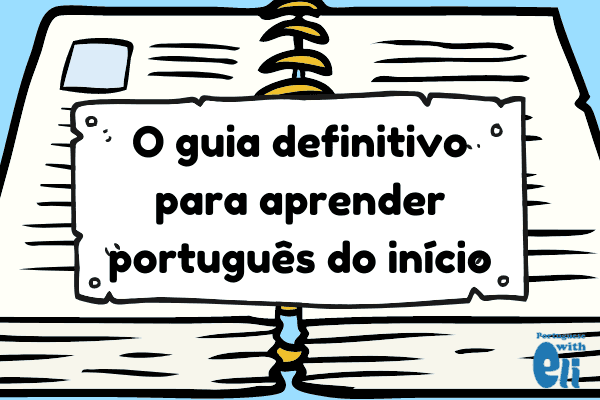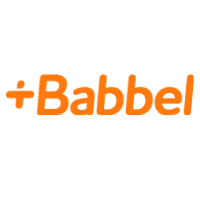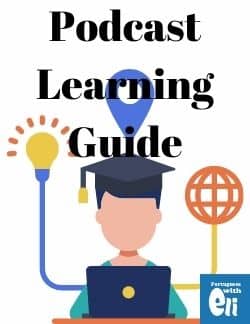The Definitive Guide to Learning Portuguese Online — From Beginner to Intermediate

When you’re learning Portuguese online, sometimes you need help. Especially if you’re doing this on your own.
Differently from what used to happen ten years ago, today online resources abound.
After a simple search online, you are flooded with results that might be relevant or not for your purposes.
How to get rid of that confusion? How to sort through the clutter and hoist only the diamonds?
Table of Contents
- It all starts with clarity.
- First steps — how to learn Portuguese online for beginners?
- What are the best resources for learning Brazilian Portuguese online for beginners?
- What if I am a beginner in Portuguese and want to learn it without apps?
- What are the best resources for learning European Portuguese online?
- What are the best resources to learn intermediate Brazilian Portuguese?
- What common pitfalls should I avoid when learning Brazilian Portuguese online?
- And where can I find Portuguese lessons online if I want to take lessons?
- And one last note.
Find Out What Your Level Is
Knowing where you stand is a sure way to know what to do. Remove all uncertainty with our free and detailed assessment of Portuguese. Take it today.
It all starts with clarity.
It’s a cliché, but if you know where you’re going you know how to get there.
If you’re a beginner, you should master everything at that level before proceeding.
Likewise, if you are at the intermediate level and have a strong foundation, it stands to reason that you challenge yourself to grow.
In this guide, you’ll not have everything that has been published about learning Portuguese online, but everything that a native Brazilian Portuguese teacher has seen time and time again to work with his students.
First steps — how to learn Portuguese online for beginners?
I said above that beginners should master everything at the beginner level.
And unfortunately, so many people misunderstand that assertion.
When I say you should master the foundational knowledge, I don’t mean to say you shouldn’t proceed if you don’t know everything.
I mean you should study and review more of the same basic content until you’re so confident you’re not second-guessing yourself every other sentence.
Considering that you’re learning Portuguese on your own, here are the resources I recommend for beginners.
What are the best resources for learning Brazilian Portuguese online for beginners?
You’ll need some structure in your studies, even if you think you won’t.
And courses that take you from the very beginning level are best. And sometimes they come with a hefty price tag.
That’s the case of Pimsleur.
I have written a detailed review on Pimsleur Brazilian Portuguese here. If you’re just a student this might be a big investment. But if you truly need Portuguese for your life, investing in Pimsleur is a great decision.
If you can’t afford Pimsleur but want to count on the structure of a step-by-step course, you might like Assimil.
I have also talked about Assimil — and other resources for Brazilian Portuguese — in this article.
The main thing you have to keep in mind is, Assimil (like Pimsleur) is for the long-term game.
You won’t see real results after two or three days of study. But if you keep to it and stick with it for three months, you’ll be thanking yourself.
Babbel

If you are slightly familiar with Rosetta Stone, you already know Babbel.
It’s best if you thrive in repetition. After a simple sign-up process that involves a quick get-to-know-you survey, you’ll be directed to the first lesson.
I’ve gone through it myself. It’s quite simple. You’ll be shown an image, a Portuguese word that describes it, a translation, and you will hear a native speaker saying that word.
You should then repeat and click next or choose the appropriate answer according to the prompt.
In this way, you can learn some basic vocabulary. And with the vocabulary you acquired you can take part in conversations that the system makes for you.
It’s a clever trick. You complete the sentences a foreign speaker would need to say in Portuguese. The voice artist even fakes a foreign accent in Portuguese!
I don’t know that you can learn very good Portuguese with Babbel, but you can have a pretty workable foundation with it.
It has some free lessons but to unlock everything you have to pay.
Memrise

If you have a hard time remembering the spelling of words in Portuguese, Memrise will help you.
It’s basically a bunch of flashcards with recordings and quizzes.
You will be shown the word with the spelling in Portuguese and common translations in English.
One of the first expressions you learn is “E aí!” which translates as “what’s up?” — a pretty good expression you’ll actually use in your daily life.
Then you’ll be quizzed — the system shows you four flashcards and you have to choose the right one that shows the word being said in the recording.
If you rack your brains and fail to remember a specific word you can click on “help me remember this.” You’ll then be prompted to create a “Mem” — a mnemonic trick to help you remember that specific word.
It’s a great resource for beginners, but you should never use this alone.
Duolingo

Duolingo is quite similar to Babbel but it’s more popular. In my opinion, you should never use Duolingo as your sole source of practice — unless of course learning Portuguese is just a hobby that you don’t need to take seriously.
I wrote more about it and all the resources in this article.
What if I am a beginner in Portuguese and want to learn it without apps?
In that case, I have a tentative curriculum for you (updated once a month):
- Learn how to greet people in Portuguese, then
- Learn a few basic sentences (these will help you with pronunciation);
- Then, pick up more formulaic sentences to help you express yourself, like Saying Thank You in Portuguese or saying that you’re sorry.
- Then, move on to more vocabulary (in this step, you want to pick up some vocabulary so you get used to the way the language sounds).
When you’re confident in using those formulaic sentences (“hi, how are you? I’m sorry!”) you could move on to some grammar.
What are the best resources for learning European Portuguese online?
In my discussion about whether you should learn European Portuguese or Brazilian Portuguese I mentioned you would have a hard time trying to find European Portuguese resources.
And that hasn’t changed. If you are at the intermediate level, you’ll find lots of resources, authentic ones that would help you take your Portuguese to the next level.
But as a beginner your choices are limited, especially if you want a free resource to learn Portuguese online.
One of the resources you could use is Memrise. They also have a European Portuguese course.
But the same caveats I put forth for Brazilian Portuguese is valid for European Portuguese.
What are the best resources to learn intermediate Brazilian Portuguese?
Aside from this website — after all, I wrote it all, and many students tell me it’s been a valuable resource — if you’re at the intermediate level you should do a lot of listening.
I have here a list of the most useful podcasts if you want authentic material. I’ve graded them according to their difficulty and subject matter.
Intermediate Portuguese Podcast

But if you want guided instruction at the intermediate level to help you pick up relevant vocabulary used in everyday life in Brazil, you can use our Intermediate Portuguese Podcast. It’s entirely in Portuguese to provide you with a controlled but immersive experience.
We publish one episode every week and we even have an accompanying learning guide that participants of our continuing education program have access to.
If you want to check out the learning guide, click here.
What common pitfalls should I avoid when learning Brazilian Portuguese online?
Having a teacher help you along is a good idea, but if for any reason you can’t have someone’s help in your journey keep your eyes wide open to the following pitfalls — they’ll hamper your progress in Portuguese.
Trying to translate everything.
I see that happen more frequently with people who have never learned a second language before.
Translating things in your head when you begin is natural and welcome. It can ease the burden on your brain. And our brains can process just so much information at any given time (limitations related specifically to working memory and the capacity of our brains).
But if you rely upon this tool too often it may become a crutch. And when it becomes a habit, it will harm your self-confidence because you want to be able to translate everything.
The solution? Translate things, it’s not a problem. But you should also learn complete sentences and phrases as “blocks”. We hardly ever use words in isolation. For me as a foreigner, the block “hardly ever” occurs like that all the time. If I think of a substitute for “rarely” that’s the block I think of.
And those blocks I’m talking about are common sentences that we use so often we don’t even think about them.
If you don’t know where to look for those blocks to get started, I have prepared a list with forty-eight useful sentences with audio.
Not reviewing foundational content frequently enough.
This is a trap I fall in myself from time to time. It’s just that sometimes reviewing the same content over and over is boring!
If you also have this kind of thought occasionally, it’s natural. You don’t need to review the same material all the time. It’s like the experiment — if you repeat the same phrase ceaselessly it suddenly loses meaning (and it has a name — semantic satiation).
What you can do in this case is use some spaced repetition software or app.
How do they work?
Simple.
You study new content today and you input some new words and phrases into the system. Then you can review them. You’ll have a choice to mark a given phrase or sentence as easy, hard, or okay. If you mark a flashcard as easy, the system will understand that it doesn’t need to force you to review it too often. But if you mark this flashcard as hard, the system will know instantly that it should show you the same flash card more often to help your brain.
And spaced repetition is nothing new. It’s the principle behind Pimsleur’s method, and it has been used over and over by many apps including Anki.
They are a number of spaced repetition applications out there, but Anki has proven itself again and again, and it’s free. Here’s a tutorial that you can follow to learn how to use Anki (and the writer makes great points on best practices with Anki).
Trying to practice Brazilian Portuguese pronunciation from the alphabet only.
Learning the alphabet does not equal to learning how to pronounce Portuguese.
The Portuguese alphabet doesn’t correspond 100% to the pronunciation of words. We delete a lot of syllables, we change a lot of sounds, and we get rid of vowels all the time.
So, you do have to learn how to pronounce the alphabet properly, but if you want to practice pronunciation the alphabet is not your best guide.
And what should you do instead?
Practice sounds.
When I say sounds, I’m talking about phonemes. I don’t want to get too technical here, but the phonemes are minimal sounds that when put together form a syllable or word… Or even a sentence. It’s the sounds behind syllables that kids learn in pre-k with the phonics.
Depending on your native language, you might have different problems.
Native English speakers have a hard time differentiating between ê and é.
So do my Hispanohablante friends.
And if Mandarin Chinese is your native language, you’ll have problems to see the difference between P and B.
For the time being, I have a resource for native English speakers to practice their pronunciation. And it’s really for all levels.
If you speak Spanish you might benefit from it. And a specific course for Hispanoablantes is in the works (for 2025!) 🙂
Next comes a course for Chinese speakers 🙂
Not giving writing some serious thought.
“I don’t need to learn how to write. I’m going to be speaking. Not writing.”
If that’s completely true, even so I will advise that you learn how to write.
You don’t need to write fiction if you’re not inclined to do so in your native language. You just need to write. You have to have the practice of holding a pen or pencil in writing words down on paper.
This is good for rote memorization but writing has numerous benefits, including helping you retain words, develop more complex structures, and have a place for producing the language.
The more you write the more you see the holes in your knowledge. If you don’t write — and you don’t have the chance to speak — how can you know what you know?
You can discover some more about it with the Comprehensible Output Hypothesis, which posits “that learning takes place when learners encounter a gap in their linguistic knowledge of the second language (L2).”
And if you don’t know where to find good resources to write, you can copy by hand the dialogues from the resources you already use.
One page a day keeps the doctor away.
And where can I find Portuguese lessons online if I want to take lessons?
Iif you ask yourself this question, I suppose you are talking about a paid resource.
If that’s the case, you can have Portuguese lessons with us — Eli and a small team of Portuguese teachers who give one-on-one lessons online.
You can also find other resources online, but I haven’t really tested tutoring platforms for Portuguese and can’t say much about them.
But I have two tips for you to choose the right online Portuguese teacher:
- Check to see if they have a track record. Don’t be misled by testimonials like “wonderful person”, “very interesting conversation”, “my favorite person in the world”. While being friendly is certainly a plus, a teacher is there not to be your friend but to be your teacher. Look for specifics in testimonials that you read.
- Check how long they have been teaching. I don’t mean to say that a new teacher can’t be a good teacher. It’s just that now with the barrier of entry to the online teaching market being nonexistent, it’s very easy for fly-by-nighters to sign up, make a buck or two, and disappear. When you decide to have lessons with a teacher it’s a commitment for both parties. If one of them is not in the game for the long run someone might be disappointed too soon.
Of course, some technical aspects are important — command of their Portuguese, command of other foreign languages, resources and teaching style… And they should be considered in each case.
And one last note.
Don’t be misled by any resource or person who says that you can learn Portuguese in one week — or in an unreasonably short amount of time.
Learning Portuguese online is simple but not easy. I’m not going to lie to you. It’s going to take time, and sometimes it’s going to be frustrating.
In this guide I try to give you some pointers to smoothen out the path and make it a little bit less frustrating.
If there is anything you would like to see added to this post, please leave it in the comments section below.
We’ll be updating this article monthly.
Last update: January 20 2025 (Links checked and updated, removed link to the Pimsleur method explanation since the website was changed and the page taken down)
The PwE Continuing Education Program
At last, a resource to help you understand more of what you hear in Portuguese. This program is the only one to provide you with an in-depth lesson each week without you having to show up! Learn more.








